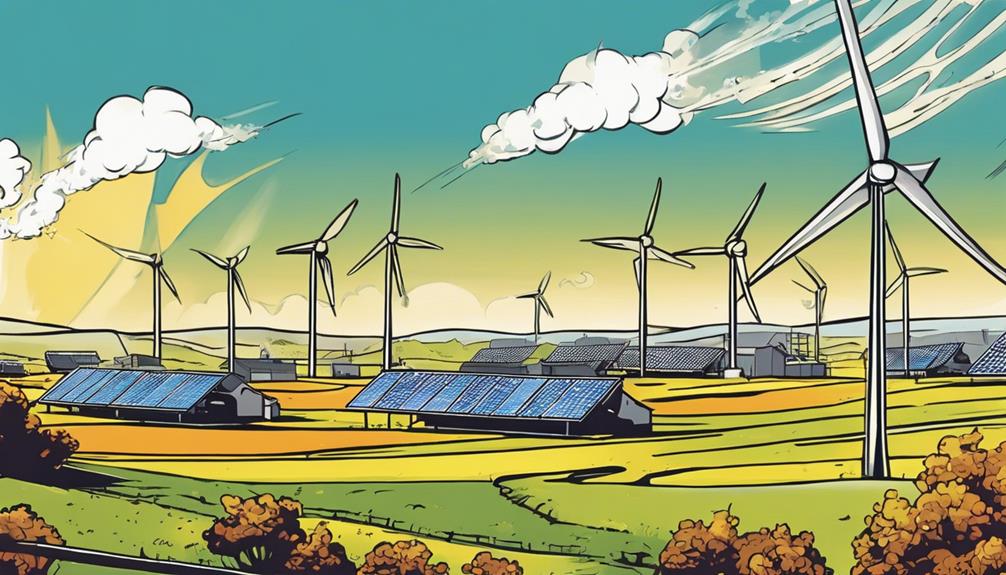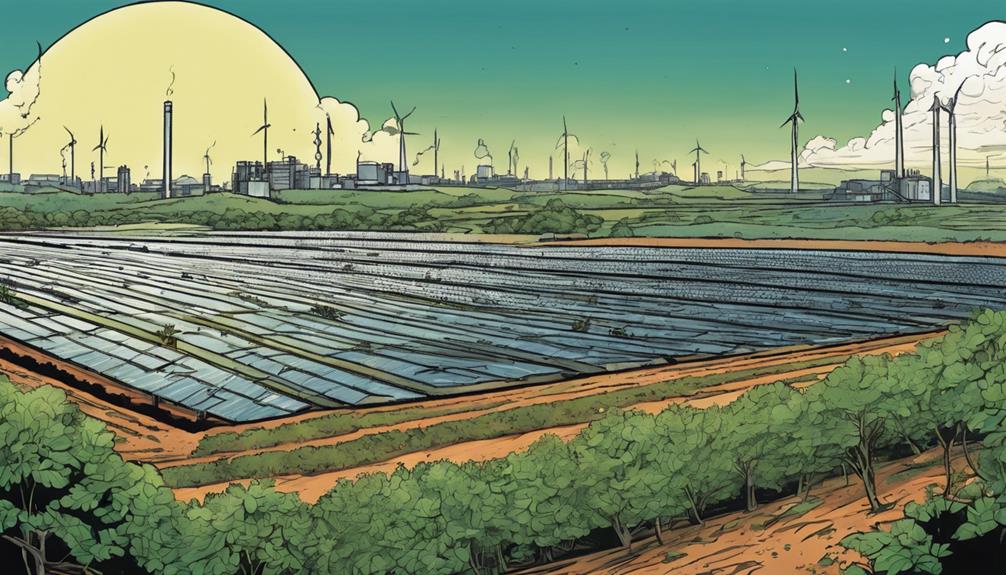As we shift towards a more sustainable future, it's clear that solar energy has emerged as a game changer. We're seeing significant decreases in the cost of solar energy and a massive growth in the global solar workforce, reaching 3.8 million jobs in 2019. Not only does solar energy promote sustainable economic development, but it's also a renewable and sustainable source that reduces our dependence on fossil fuels. We're excited to explore how solar energy is mitigating climate change effects and promoting a cleaner, healthier planet for future generations – and we're just getting started.
Key Takeaways
- Solar energy is a renewable and sustainable source, reducing dependence on fossil fuels and promoting clean technologies.
- The solar industry's growth has a positive impact on the economy, creating jobs and promoting sustainable economic development.
- Solar energy helps mitigate climate change effects by reducing greenhouse gas emissions and conserving natural resources.
- Effective integration of solar energy into grids requires upgrading infrastructure, addressing variable output, and developing regulatory frameworks.
- Investing in solar energy contributes to achieving sustainable development goals, protecting ecosystems, and creating a healthier planet for future generations.
Economic Benefits of Solar Energy

As we shift towards a more sustainable future, we're discovering that solar energy isn't only good for the planet, but also a lucrative opportunity that's creating jobs and stimulating local economies.
The cost of solar energy has decreased significantly over the years, making it more affordable and viable. In 2019, the global solar workforce reached 3.8 million jobs, with projections of further growth. Installation and maintenance of solar energy systems require skilled labor, providing job opportunities.
We're seeing solar energy promote sustainable economic development and reduce reliance on fossil fuels. It's a win-win for our planet and our wallets. We're excited to see the continued growth of the solar industry and its positive impact on our economy.
Environmental Advantages of Solar Power

We're harnessing the power of the sun to generate electricity without producing harmful emissions or pollutants, making solar energy a game changer for the environment.
Solar power positively impacts the environment by being a renewable and sustainable energy source. We're reducing dependence on fossil fuels, major contributors to air pollution and climate change.
By adopting solar power, we're promoting clean and green technologies for sustainable development. Solar energy helps in reducing greenhouse gas emissions, conserving natural resources, and mitigating climate change effects.
As we continue to shift towards solar energy, we're creating a cleaner and healthier planet for future generations.
Reducing Greenhouse Gas Emissions

TEXT:
- The first step in the research process is to define your research question. This will help guide your research and focus your efforts.
- Once you have your research question, you can start gathering relevant information from various sources such as books, articles, and websites.
- After collecting the necessary data, the next step is to analyze and interpret the information to draw meaningful conclusions.
- With your analysis completed, you can then present your findings in a clear and organized manner, often through a research paper or presentation.
This structured approach ensures that your research is systematic and thorough, leading to valuable insights and contributions to your field of study.
Challenges of Solar Energy Integration

While solar energy offers numerous benefits, its integration into existing infrastructure poses significant challenges that must be addressed to ensure a smooth switch to a more sustainable energy mix. As we shift towards a cleaner and greener future, we must acknowledge the obstacles that lie ahead.
Here are some of the key challenges we face:
- Compatibility issues: Upgrading infrastructure to accommodate solar power systems can be costly and time-consuming.
- Grid integration challenges: The sporadic nature of solar energy poses significant grid integration challenges.
- Storage solutions: We need to develop effective storage solutions to deal with the variability of solar power generation.
- Regulatory frameworks: Our regulatory and policy frameworks must adjust to support the integration of solar energy into existing infrastructure.
Promoting Sustainable Development Goals

By tapping into the power of solar energy, we can make significant strides towards achieving sustainable development goals, including access to affordable and clean energy, climate action, and sustainable cities and communities.
We can reduce our dependence on fossil fuels, decreasing greenhouse gas emissions and mitigating the impacts of climate change. Solar energy promotes sustainable economic development, creating jobs and stimulating local economies.
As we shift to a more renewable energy mix, we'll conserve natural resources and reduce air pollution. By embracing solar power, we're investing in a cleaner, healthier planet for future generations.
It's time to leverage the benefits of solar energy and drive progress towards a more sustainable future.
Mitigating Climate Change Effects

As we harness the power of solar energy, we're taking a pivotal step towards mitigating the devastating effects of climate change, from rising sea levels to intense natural disasters. By shifting away from fossil fuels, we're reducing our carbon footprint and slowing down global warming.
Here are just a few ways solar energy helps combat climate change:
- Reducing greenhouse gas emissions: Solar energy generates electricity without emitting pollutants, making it an essential solution to reducing our carbon footprint.
- Conserving natural resources: By harnessing sunlight, we're reducing our dependence on finite resources like coal and oil.
- Slowing global warming: Solar energy helps mitigate the effects of climate change by reducing the amount of heat-trapping gases in the atmosphere.
- Protecting ecosystems: By reducing pollution and preserving natural resources, solar energy helps safeguard ecosystems and biodiversity.
A Cleaner and Healthier Planet

We're not only mitigating climate change effects but also creating a cleaner and healthier planet for future generations by adopting solar energy, which cuts down on air and water pollution. By harnessing the power of the sun, we reduce our reliance on fossil fuels, a major contributor to environmental degradation. This shift towards solar energy has a profound impact on our ecosystem.
| Environmental Benefits | Solar Energy Impact | Outcome |
|---|---|---|
| Air Pollution | Reduces emissions | Cleaner air |
| Water Pollution | Decreases water contamination | Pure water |
| Climate Change | Lowers greenhouse gas emissions | Slows global warming |
Frequently Asked Questions
What Is the Average Lifespan of a Solar Panel?
"We're curious about the average lifespan of a solar panel. Typically, it lasts around 25-30 years, with some panels lasting up to 40 years or more, depending on quality and maintenance."
How Does Solar Energy Impact Agricultural Productivity?
We're thrilled to share that solar energy can boost agricultural productivity by 15%! By powering irrigation systems and reducing water usage, solar energy helps farmers increase crop yields while conserving this precious resource.
Can Solar Energy Be Used for Heating and Cooling Systems?
We can definitely use solar energy for heating and cooling systems – it's a great way to reduce our reliance on fossil fuels and lower emissions, making our homes and buildings more sustainable and environmentally friendly.
What Is the Role of Energy Storage in Solar Power Systems?
"We're on the same page when it comes to energy storage – it's the missing piece of the puzzle for solar power systems. Without it, the intermittent nature of solar energy is a major hurdle, but with it, we can store excess energy for later use, smoothing out the bumps."
How Does Solar Energy Affect Property Values?
We've found that installing solar panels can actually increase property values, as they're seen as a desirable feature that reduces energy costs and enhances the property's appeal to environmentally conscious buyers.
Conclusion
As we wrap up our journey into the world of solar energy, we're left wondering – what's holding us back? We've got the stats, the benefits, and the solutions. So, why are we still stuck in the dark ages of fossil fuels?
It's time to flip the switch and harness the power of the sun. The future is bright, and it's powered by solar energy. Let's shine a light on a sustainable tomorrow, today.









